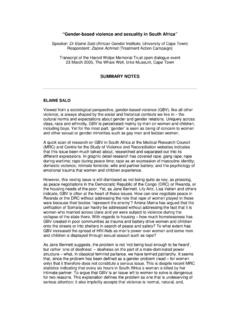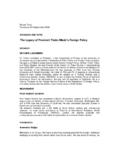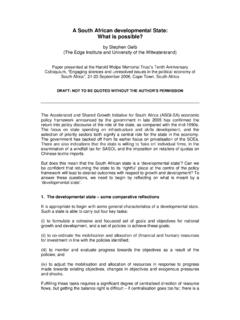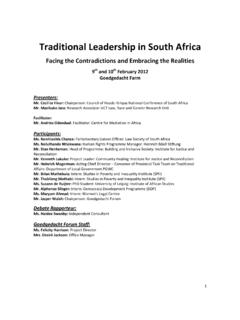Transcription of `PUBLIC PENSIONS IN SOUTH AFRICA - Harold Wolpe
1 1 THE PRIVATE AFFAIRS OF public PENSIONS IN SOUTH AFRICA DEBT, DEVELOPMENT AND CORPORATIZATION1 Fred Hendricks faculty of humanities Rhodes university Grahamstown SOUTH AFRICA We are limited in SOUTH AFRICA because our democratic Government inherited a debt which at the time we were servicing at the rate of 30 billion rand a year. That is thirty billion we did not have to build houses, to make sure our children go to the best schools, and to ensure that everybody has the dignity of having a job and a decent in-come. Nelson Mandela (ACTSA 2002) The first charge against government revenue is interest on government debt. The big-ger our deficit, the more we have to borrow, the higher the interest bill and the less money there is available to invest in social development, in poverty relief and in the development of our human resources. Trevor Manuel, Finance Minister (1997) The bulk of our debt is the domestic debt of ordinary SOUTH Africans through the pub-lic pension funds.
2 Trevor Manuel, Finance Minister (1999) 1. INTRODUCTION Toward the end of its rule, the apartheid government converted its contributory pension sys-tem for employees in the public sector from one that effectively functioned as a pay-as-you-go (PAYG) scheme to a fully-funded (FF) scheme. This paper seeks to explain the reasons behind this change and to understand its contemporary consequences. It does this within the context of the enormous development challenges facing SOUTH AFRICA and the inadequacy of the social policy responses of the new democratic government. Conceptually, the paper is lo-cated within a new broadside in development thinking, one that asserts an intrinsic role for the social policies of the state in the development process. In so doing, this approach seeks to shake social policy loose from its moorings to the remedial action associated with the disci-pline of social work. Instead, it proposes that social policy should encompass a fully-fledged developmental and redistribution agenda.
3 SOUTH AFRICA is currently one of the most unequal countries in the world. The poorest 20 per cent of the population earns a mere per cent of total income while the richest 20 per cent earns per cent and the Gini coefficient has grown steadily to reach by 2006 (Presi-dency, RSA 2007:23-24). Inequality is increasing along a wide range of indicators both be-tween apartheid defined racial categories and within them. Since the democratic transition in 1994, the benefits of black economic empowerment and affirmation action measures have al- paper forms part of the UNRISD project on Financing Social Policy. 2 lowed a significant proportion of previously disenfranchised blacks to change the pattern of social stratification of the managerial and upper classes. However, the main problem confront-ing the country today remains the problem of black poverty. This is the principal challenge, and the success or failure of social policies for development needs to be assessed against the extent to which they meet it.
4 The costs of the decision to retain the fully-funded pension sys-tem in SOUTH AFRICA will be considered in this context. The end of apartheid had a very significant effect on the provision of public non-contributory and contributory PENSIONS . In respect of the former, over a period of merely one decade there was a dramatic increase in the number of recipients of social PENSIONS and other grants (van der Merwe 2004:312). Non-contributory PENSIONS form a crucial component of the welfare and social security policies of the state because they represent a substantial transfer of state funds to the poor, and they contribute directly to the well-being of SOUTH Africans. Currently, the means tested Old Age grant of R870 ($1= R7) per month to those unable to sustain them-selves is often the difference between survival and utter destitution. Many families, especially those in rural areas, are heavily dependent on these PENSIONS as a sole source of income, and there can be little doubt that access to PENSIONS has had a substantial influence on levels of poverty.
5 Needless to say, the manner in which race and class continue to coincide in complex ways in SOUTH AFRICA means that the overwhelming majority of people who are poor are black, and those most in need of public protection are elderly rural blacks (Devereux 2001). It is es-sential to recognize the vital role of non-contributory disbursements made by the state to the poor. However, this paper deals more specifically with contributory PENSIONS in the public sec-tor and the opportunities these funds present for a social policy of inclusive development. In addition to social non-contributory PENSIONS , and contributory occupational PENSIONS in the public sector there are two further types of funds in SOUTH AFRICA , namely private occupational PENSIONS and voluntary savings through, for example, retirement annuities. On the face of it, SOUTH AFRICA exhibits the fiscal and institutional capacities for a differentiated system that satis-fies the World Bank s multi-pillar requirement for pension schemes (van der Merwe 2004:310).
6 It is important though to emphasize that the differentiation in types of pension schemes still coincides largely, but not entirely, with the racialized divisions of apartheid. In general, the PAYG system operates on the basis of a zero funding level. The contributions made by current employers and employees go directly to finance the PENSIONS of retired work-ers. This system implies an ongoing cycle of contributions and benefits between workers and pensioners, and the assumption is that no surplus ought to be generated and no capital accu-mulated beyond a technical reserve. Nothing is supposed to be saved to pay for the future pen-sions and other benefits of current contributors. In contrast, the FF system operates along the same lines as a private insurance: individual contributions are deposited into a saving s account and invested in interest-bearing financial instruments or equities. Once retirement age is reached, the accumulated funds (contributions plus investment returns minus administrative and insurance costs) are converted into a retirement benefit, usually an annuity or some sort of programmed withdrawals.
7 Fully-funded pension schemes are characterized by a greater expo-sure to the risks and attendant uncertainties of the market especially when it involves the pur-chase of equities (Ribhegge 1999:61). The conversion to this system in SOUTH AFRICA happened when the National Party regime knew that the end of its rule was imminent and the consequences of this shift are still felt today. It was a decision that has led directly to a dramatic increase in national debt as the public ser- 3 vants of the previous regime consciously indebted the state in order to safeguard their own PENSIONS and retrenchment packages in retirement. This move was clearly motivated by the perceived political risks associated with the anticipation of a redistributive democratic gov-ernment. Unlike other indebted governments, the major portion of national debt in SOUTH AFRICA is inter-nal rather than external. In effect, the government is indebted to itself through the FF pension system as the transition from a PAYG system to a fully-funded one implied that former contri-butions to the public pension schemes had to be securitized via government bonds that were deposited in the newly created pension fund.
8 Secondly, contributions of current employees were directed into the pension fund while current PENSIONS had to be financed out of the budget. This costly transition had detrimental implications for social investment, especially in the areas of education, health and welfare. The introductory quotations by Nelson Mandela, first President of a liberated SOUTH AFRICA and Trevor Manuel, the current Finance Minister, graphically illustrate the constraints imposed by this debt on the new state in dealing with the iniquitous legacies of colonialism and apartheid. This paper suggests that these constraints are not immutable. Instead, it argues that policy choices in respect of the pension system have pro-foundly shaped the overall economic prospects of the country. In so far as the levels of ine-quality in SOUTH AFRICA pose the greatest threat to the new democracy, these policy choices have had contradictory effects. On the one hand, the non-contributory public PENSIONS have certainly benefited many poverty-stricken black SOUTH Africans.
9 On the other hand, the fully-funded system of contributory PENSIONS for workers in the state sector has had the dual effect of entrenching the deals made with senior public officials of the apartheid government as well as enriching a very small group of black entrepreneurs who have profited directly from the centralized asset management of public pension funds. This paper deals with the interconnections between public debt, contributory PENSIONS in the public sector, the corporatization of the management of these public funds, the contradictions of Black Economic Empowerment and the failure of SOUTH African social policy in respect of contributory public PENSIONS to deal more comprehensively with its development challenges. It does this by: 1. Describing the political and institutional evolution of SOUTH African pension schemes with a special focus on the reform of contributory public pension schemes toward the end of apartheid. 2.
10 Examining the governance structure of the pension system in order to establish whether it is transparent and accountable, while ensuring that the pension system is able to pursue its main roles of social protection, redistribution and contribution to economic development and social cohesion (Mkandawire 2004). In particular, the pa-per investigates the institutions which serve public PENSIONS such as the Government Employees pension Fund (GEPF) and the public Investment Corporation (PIC). This outline of the intricate institutional complexes in respect of contributory PENSIONS in the public sector reveals both the limits and the possibilities for inclusive development 3. Analysing the investment policy of the public pension fund, paying special attention to whether this fund has been invested to build economic and social infrastructure. Essen-tially the question to be asked is whether the enormous stockpile of capital (the PIC s estimated assets are currently worth about R600billion) is being utilized to promote development or not and how it relates to capital accumulation generally (PIC 2006).











